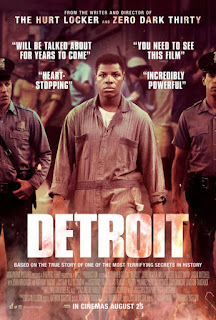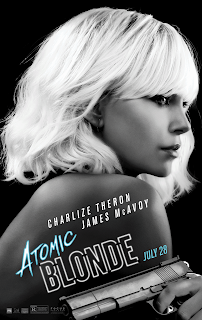Detroit - Review
Director: Kathryn Bigelow
Cast: John Bodega, Will Poulter, Algee Smith, Jason Mitchell, John Krasinski, Anthony Mackie, Kaitlyn Dever
 1967 is considered to be the Summer of Love but in the same year, the city of Detroit in the US state Michigan experienced nothing but intolerance, violence and severe persecution as racial tensions were at an all-time high. Centuries of white oppression acted as the catalyst for the uprising in the African-American community and frequent collaborators Kathryn Bigelow and scribe Mark Boal partner once again to bring this moment in history back into mainstream consciousness.
1967 is considered to be the Summer of Love but in the same year, the city of Detroit in the US state Michigan experienced nothing but intolerance, violence and severe persecution as racial tensions were at an all-time high. Centuries of white oppression acted as the catalyst for the uprising in the African-American community and frequent collaborators Kathryn Bigelow and scribe Mark Boal partner once again to bring this moment in history back into mainstream consciousness.
Summer, 1967. Rioting and civil unrest is tearing Detroit apart. A report of gunshots leads the Detroit Police Department to the Algiers Motel where several police officers show complete disregard for procedure and violently interrogate guests to get a confession. Once the night is over, three unarmed men are shot and killed and others are savagely beaten.
The shattering riots took place over five days but the majority of Detroit's run time is devoted to the incident at the Algiers Motel on the third night of the riots. Mistaking a toy pistol for open fire, the police descend upon the Algiers, a refuge from the relentless violence and injustice that seized virtually every street in the city. The suspects are rounded up, with one being killed before questioning can even begin after attempting to exit the scene, and are made to face the wall whilst they are brutally interrogated. Police officer Philip Krauss (Will Poulter) quickly assumes control of the situation and abuses his position of power to coerce a confession that none of the suspects have. Earlier in the picture we see Krauss shoot a fleeing shoplifter in the back without a moments hesitation, like a hunter sniping wild animals to satisfy a sick desire. But that's just a taster of Krauss' horrifyingly racist behaviour as he tortures innocents and lords over them with fear whilst dismissing his violations as a game.
Detroit is one of the year's most engaging films and never releases the audience from its iron grip or allows them to relax. The true story and its potency to the current social and political climate are translated with a tautly shocking sense of urgency primarily through the guerrilla-style cinematography by Paul Greengrass' trusted DP Barry Ackroyd. The most passive of voyeurs are immediately turned into active participants and the hand-held shaky camera work fulfils its purpose of denoting a gritty realism. Every frame feels invasive and unstated. as do the performances that pour out of the actors who clearly approached their roles with significant respect for the history that they're recreating. Casting the youthful Will Poulter as the tyrannical Krauss was an inspired choice and engagingly effective whilst Boyega's role is smaller in scale but no less rich as his unique position creates compelling internal conflict that inhibits his external actions However, the real standout is Algee Smith as Larry Reed, a young man with big dreams of becoming a recording artist and performing to adoring crowds - but his experience at the Algiers triggers a cataclysmic shift in his psyche and reshapes the course of his life forever.
Bigelow's previous films, The Hurt Locker and Zero Dark Thirty, both have their moments where the images on screen prove to be tough viewing but it's her work here in Detroit that is the most difficult to stomach. The death and violence inflicted upon the small group of people residing in the Algiers that fateful night is captured in raw and unflinching fashion, and an event that took place over a single night is made to feel like an eternity for the viewer. Detroit's second act is an elongated, intense white-knuckle ride where no one emerges unscathed (both physically and emotionally) whilst the third act is less viscerally immersive but riddled with injustice nonetheless. There's a genre shift to a courtroom drama where the whitewashed outcome sees the three police officers responsible for the abomination go unsentenced. It's emotionally bruising but the final its feels rushed and sold with less conviction than the two that precede it.
An intense and provocative experience, Detroit forcefully makes us confront a historic event that depressingly keeps repeating itself.
EB
Cast: John Bodega, Will Poulter, Algee Smith, Jason Mitchell, John Krasinski, Anthony Mackie, Kaitlyn Dever
 1967 is considered to be the Summer of Love but in the same year, the city of Detroit in the US state Michigan experienced nothing but intolerance, violence and severe persecution as racial tensions were at an all-time high. Centuries of white oppression acted as the catalyst for the uprising in the African-American community and frequent collaborators Kathryn Bigelow and scribe Mark Boal partner once again to bring this moment in history back into mainstream consciousness.
1967 is considered to be the Summer of Love but in the same year, the city of Detroit in the US state Michigan experienced nothing but intolerance, violence and severe persecution as racial tensions were at an all-time high. Centuries of white oppression acted as the catalyst for the uprising in the African-American community and frequent collaborators Kathryn Bigelow and scribe Mark Boal partner once again to bring this moment in history back into mainstream consciousness.Summer, 1967. Rioting and civil unrest is tearing Detroit apart. A report of gunshots leads the Detroit Police Department to the Algiers Motel where several police officers show complete disregard for procedure and violently interrogate guests to get a confession. Once the night is over, three unarmed men are shot and killed and others are savagely beaten.
The shattering riots took place over five days but the majority of Detroit's run time is devoted to the incident at the Algiers Motel on the third night of the riots. Mistaking a toy pistol for open fire, the police descend upon the Algiers, a refuge from the relentless violence and injustice that seized virtually every street in the city. The suspects are rounded up, with one being killed before questioning can even begin after attempting to exit the scene, and are made to face the wall whilst they are brutally interrogated. Police officer Philip Krauss (Will Poulter) quickly assumes control of the situation and abuses his position of power to coerce a confession that none of the suspects have. Earlier in the picture we see Krauss shoot a fleeing shoplifter in the back without a moments hesitation, like a hunter sniping wild animals to satisfy a sick desire. But that's just a taster of Krauss' horrifyingly racist behaviour as he tortures innocents and lords over them with fear whilst dismissing his violations as a game.
Detroit is one of the year's most engaging films and never releases the audience from its iron grip or allows them to relax. The true story and its potency to the current social and political climate are translated with a tautly shocking sense of urgency primarily through the guerrilla-style cinematography by Paul Greengrass' trusted DP Barry Ackroyd. The most passive of voyeurs are immediately turned into active participants and the hand-held shaky camera work fulfils its purpose of denoting a gritty realism. Every frame feels invasive and unstated. as do the performances that pour out of the actors who clearly approached their roles with significant respect for the history that they're recreating. Casting the youthful Will Poulter as the tyrannical Krauss was an inspired choice and engagingly effective whilst Boyega's role is smaller in scale but no less rich as his unique position creates compelling internal conflict that inhibits his external actions However, the real standout is Algee Smith as Larry Reed, a young man with big dreams of becoming a recording artist and performing to adoring crowds - but his experience at the Algiers triggers a cataclysmic shift in his psyche and reshapes the course of his life forever.
Bigelow's previous films, The Hurt Locker and Zero Dark Thirty, both have their moments where the images on screen prove to be tough viewing but it's her work here in Detroit that is the most difficult to stomach. The death and violence inflicted upon the small group of people residing in the Algiers that fateful night is captured in raw and unflinching fashion, and an event that took place over a single night is made to feel like an eternity for the viewer. Detroit's second act is an elongated, intense white-knuckle ride where no one emerges unscathed (both physically and emotionally) whilst the third act is less viscerally immersive but riddled with injustice nonetheless. There's a genre shift to a courtroom drama where the whitewashed outcome sees the three police officers responsible for the abomination go unsentenced. It's emotionally bruising but the final its feels rushed and sold with less conviction than the two that precede it.
An intense and provocative experience, Detroit forcefully makes us confront a historic event that depressingly keeps repeating itself.
EB



Comments
Post a Comment